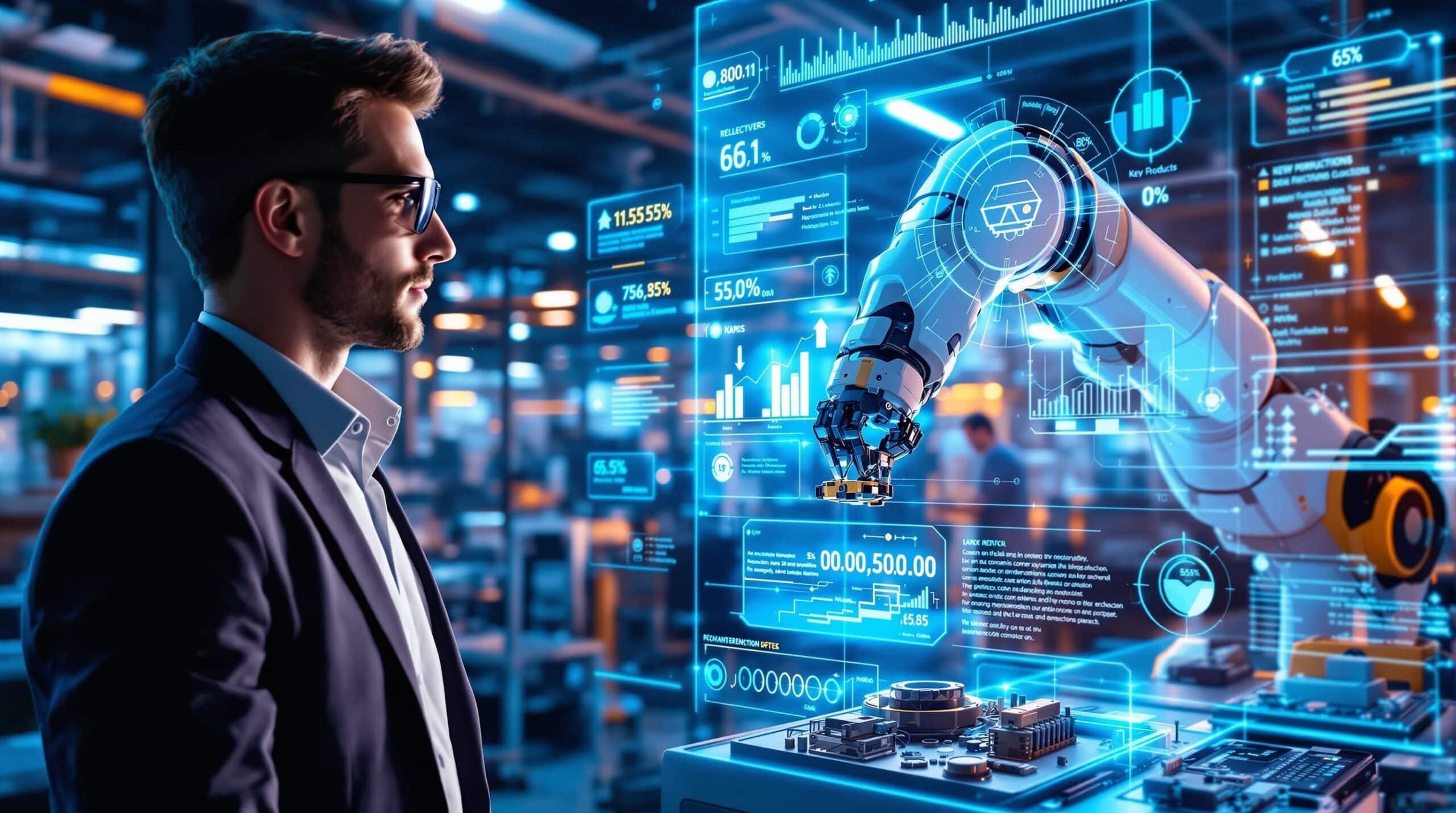
Introduction
Imagine a company where every tedious task is completed at lightning speed, decisions are made on the basis of accurate, up-to-date data, and innovation is fueled by cutting-edge technology. No matter if it sounds like something out of a science fiction novel, it's today's reality thanks to automation and artificial intelligence (AI). Let's dive into this exciting world to understand how these technologies are transforming the modern enterprise.
Defining automation and artificial intelligence within companies
Enterprise automation refers to the use of technology to perform repetitive tasks without human intervention. This includes everything from algorithms managing inventory to robots on production lines. Among these technologies, artificial intelligence stands out for its ability to learn and adapt. Unlike traditional systems, AI uses methods such as machine learning to improve its performance over time.
AI and automation are often complementary. For example, robotic process automation (RPA) systems can be enhanced by artificial intelligence to manage not only strictly defined tasks, but also to deal with unforeseen situations with near-human precision.
Business processes commonly automated by AI
Automation and enterprise can be found in many key areas. The most mature industries have already begun to automate critical processes with AI:
- Inventory management: Use of algorithms to predict necessary stock levels, thus reducing storage and out-of-stock costs.
- Customer service: AI-powered chatbots that resolve customer queries in real time.
At the same time, artificial intelligence is proving vital for sophisticated workflow systems, where it optimizes the production chain or service delivery with unrivalled precision.
Improving productivity with AI
Imagine if every employee in your company could stay focused on strategic, high-value-added tasks. This is precisely what AI enables, by taking care of repetitive and time-consuming tasks. Intelligent software scans thousands of pieces of data to identify trends and opportunities, enabling the company to react quickly and effectively.
AI also helps to reduce lead times through task optimization, resulting in an overall increase in productivity and a reduction in operating costs. Machine learning algorithms are designed to detect inefficiencies and propose continuous improvements, creating a virtuous cycle of performance improvement.
The role of AI in optimizing business operations and strategy
A winning strategy is often based on informed decisions. Today, automation and artificial intelligence provide the data base needed to make such decisions. CEOs and CFOs are using AI platforms to create simulations and scenarios based on behavioral and market data. These tools enable more precise planning and anticipation of changing conditions.
In addition, solutions such as cloud computing facilitate the implementation of competitive intelligence mechanisms and automated SWOT analysis, supporting the continuous optimization of corporate strategy.
Logistics management and predictive maintenance using AI
The logistics field also benefits enormously from automation and AI. Thanks to AI, companies can not only plan shipments with greater precision, but also anticipate supply chain problems before they occur.
Predictive maintenance is another major application. Unlike traditional maintenance, where repairs are carried out after faults have occurred, AI makes it possible to anticipate failures thanks to predictive models. This translates into a significant reduction in downtime and maintenance costs.
Understanding the difference between RPA and AI automation
Robotic process automation (RPA) is often confused with AI-driven automation, although they are distinct. RPA focuses on automating specific, repetitive, rule-based tasks, typically in administrative processes. It doesn't understand or learn.
AI, on the other hand, goes one step further. By integrating learning and adaptation processes, AI can handle complex, unstructured tasks that require human-like cognition. This capability makes AI a powerful tool for complete digital transformation.
Common challenges in implementing AI automation and how to overcome them
There are several challenges to implementing AI automation. First, there is resistance to change within organizations. Employees may fear losing their jobs. To overcome this challenge, it's crucial to invest in retraining and education, enabling employees to upskill and take on new roles.
Then there are technical challenges such as integration with existing systems. A thorough assessment of existing infrastructures is necessary before deploying AI solutions. It's also crucial to work with providers experienced in digital transformation.
Measuring the success and ROI of AI automation solutions
Successful deployment depends on the ability to measure its impact. Key performance indicators (KPIs) such as productivity, operational efficiency and customer satisfaction are practical measures.
For an accurate return on investment (ROI), compare initial implementation costs with savings and productivity gains over a given period. Using AI-enabled dashboards and CRM (Customer Relationship Management) systems will help capture this data seamlessly and validate the success of projects.
Data security and confidentiality in AI automation
With AI automation, data security and confidentiality concerns are paramount. Strict protocols must be put in place to protect sensitive information. Using the cloud can offer robust security solutions, but it's essential to comply with current regulations such as the RGPD in Europe.
Companies also need to invest in regular audits and updates of their security systems to prevent data leaks and cyber-attacks.
Conclusion
The age of automation and artificial intelligence is already here, radically transforming the way businesses operate. By embracing these technologies, companies can not only improve productivity and efficiency, but also reinvent the way they design strategies and make decisions. Are you ready to automate for a brighter future? Leave your comments below and share how you're integrating AI into your business.
FAQ
How will AI transform jobs?
AI will transform jobs by automating repetitive tasks, enabling employees to focus on creative, high-value-added tasks. It will also encourage the creation of new roles focused on the management and expansion of AI systems.
What are the challenges and solutions in implementing process automation?
The main challenges include resistance to organizational change and technical obstacles. To overcome these, it is essential to train employees and choose flexible, scalable solutions.
What is process automation?
Process automation is the use of technology to perform repetitive, predictable tasks without human intervention, thereby improving efficiency and precision.
What are automation and artificial intelligence in the workplace?
It's the integration of automated technologies and AI to optimize business processes, increase productivity and make decisions based on accurate, real-time data.
What kinds of business processes can be automated using AI?
Processes such as inventory management, customer service, data analysis, and predictive maintenance can all be automated using AI.
How does AI improve business productivity?
AI improves productivity by taking over repetitive tasks, reducing errors and optimizing processes, enabling employees to focus on more strategic activities.
What optimization levers does AI offer companies?
AI offers optimization levers such as predictive analysis, automation of complex workflows, and improved decision-making through the exploration of large quantities of data.
How does AI impact logistics management and predictive maintenance?
AI enables more efficient logistics management by optimizing delivery routes and forecasting variations in demand. For predictive maintenance, it identifies breakdowns before they happen.
What's the difference between robotic process automation (RPA) and AI automation?
RPA automates tasks based on fixed rules, while AI automation incorporates learning and adaptation capabilities to handle more complex tasks.
What are the common challenges associated with implementing AI automation, and how can they be overcome?
Challenges include resistance to change, technical barriers and data security issues. They can be overcome with the right training, careful planning and robust security measures.






